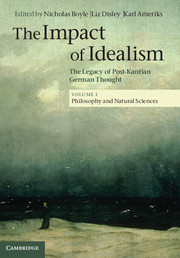Book contents
- Frontmatter
- Contents
- List of Illustrations
- List of Contributors
- Acknowledgements
- List of Abbreviations
- Foreword
- General introduction: the eighteenth and nineteenth centuries
- General introduction: the twentieth and twenty-first centuries
- Introduction: Idealism in the natural sciences and philosophy
- 1 Philosophy of natural science in Idealism and neo-Kantianism
- 2 The impact of German Idealism and Romanticism on biology in the nineteenth century
- 3 The unconscious: transcendental origins, Idealist metaphysics and psychoanalytic metapsychology
- 4 Nietzsche, Kant and teleology
- 5 Transcendental idealism, phenomenology and the metaphysics of intentionality
- 6 Heidegger and the impact of idealism
- 7 French Hegelianism and anti-Hegelianism in the 1960s: Hyppolite, Foucault and Deleuze
- 8 Scottish Idealism
- 9 ‘My station and its duties’: social-role accounts of obligation in Green and Bradley
- 10 Idealism and the origins of analytic philosophy1
- 11 Idealism and Pragmatism: the inheritance of Hegel's concept of experience
- 12 Reason's form
- Bibliography
- Index
Foreword
Published online by Cambridge University Press: 05 December 2013
- Frontmatter
- Contents
- List of Illustrations
- List of Contributors
- Acknowledgements
- List of Abbreviations
- Foreword
- General introduction: the eighteenth and nineteenth centuries
- General introduction: the twentieth and twenty-first centuries
- Introduction: Idealism in the natural sciences and philosophy
- 1 Philosophy of natural science in Idealism and neo-Kantianism
- 2 The impact of German Idealism and Romanticism on biology in the nineteenth century
- 3 The unconscious: transcendental origins, Idealist metaphysics and psychoanalytic metapsychology
- 4 Nietzsche, Kant and teleology
- 5 Transcendental idealism, phenomenology and the metaphysics of intentionality
- 6 Heidegger and the impact of idealism
- 7 French Hegelianism and anti-Hegelianism in the 1960s: Hyppolite, Foucault and Deleuze
- 8 Scottish Idealism
- 9 ‘My station and its duties’: social-role accounts of obligation in Green and Bradley
- 10 Idealism and the origins of analytic philosophy1
- 11 Idealism and Pragmatism: the inheritance of Hegel's concept of experience
- 12 Reason's form
- Bibliography
- Index
Summary
What was Idealism and what is it now?
Idealism was set in motion by a number of factors. It can be seen equally as the deflection of a loss and as the opening up of a perspective on a broad new intellectual landscape.
Neither the concepts of traditional metaphysics nor the procedures of mathematical natural science are adequate to the processes by which human experience and self-understanding are constructed. They both fail when faced with the task of accounting for the formation of the basic units that organise the realities in which human living is embedded: the organism, the historical world, religion, the state, the practice of art. These forms of reality, and the sources of their grounding, are the ‘ideas’ that have given Idealism its name.
In order to end a situation in which what was closest and most essential to Man necessarily remained incomprehensible to him, the Idealists had to find conceptualisations and a philosophicalmethod that would permit some insight into these realities. Such a method would have to be capable of eliminating the alienation of dispassionate scientific explanation from conscious human experience so as at the same time to illuminate that experience from within and to liberate it. But since the Idealists started out from a critique of the established paths to knowledge they had to expect their search for an appropriate method not only to open up new depths of insight but also to reveal profound dilemmas and ambiguities in the approach to the manifold realities that determine human life. Only subsequently might it be possible to establish, and eventually to confirm, the prospect of understanding all reality as a whole and from its very foundations.
- Type
- Chapter
- Information
- The Impact of IdealismThe Legacy of Post-Kantian German Thought, pp. xv - xviPublisher: Cambridge University PressPrint publication year: 2013



